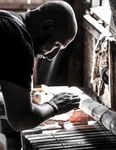AFAM SURVIVAL GUIDE - Connecting our local and wider community - Boston University
←
→
Page content transcription
If your browser does not render page correctly, please read the page content below
VOL. 2 NO. 6
AFAM
SURVIVAL
GUIDE
Yuri Kochiyama with two civil rights activists.
Connecting our local and wider community
If you have anything you would like to see in the next issue,
email us at afam@bu.eduBobi Wine: the reggae singer streaming now
vying to be Uganda’s next ONE NIGHT IN MIAMI
president
Streaming on: Amazon
Prime Video
On the night of Feb. 25,
1964, in Miami, Cassius Clay
joins Jim Brown, Sam
Cooke and Malcom X, and
they discuss the
responsibility of being
successful black men
during the civil rights
movement.
THE BLACK GODFATHER
Streaming on: Netflix
listen in Clarence Avant, known as
“the godfather of black
THE FIRE STILL BURNING music”, is perhaps not well
This podcast gets into some of the most known by the general
urgent lessons we can learn from James public, but very famous in
Baldwin, whose life and writing illuminate the music industry. Starting
so much about what it would really mean as a manager to pianist-
for the United States to reckon with its
race problem. composer Lalo Schifrin, he
KWAME DAWES READS later founded record labels,
DEREK WALCOTT served as concert organizer,
Kwame Dawes joins Kevin Young to read a special events producer, a
“The Season of Phantasmal Peace,” by fund-raiser for Democratic
Derek Walcott, and his own poem “Before politicians, and a mentor to
Winter.” Dawes is the author of more than
twenty books of poetry, fiction, and several African American
nonfiction. execs.cooking: harira THE MUSEUM OF AFRICAN AMERICAN ART:
LOS ANGELES -
THE PALMER C. HAYDEN COLLECTION
INGREDIENTS
4 TABLESPOONS OLIVE OIL
1 LARGE ONION, DICED (ABOUT 2 CUPS)
3 STALKS CELERY, DICED (ABOUT 1 1/2
CUPS)
3 LARGE CARROTS, PEELED AND CUT IN
ROUNDS
1/2 TEASPOON GROUND TURMERIC
1 TEASPOON GROUND CUMIN
1/2 TO 1 TEASPOON HARISSA OR DRIED RED Can't Sleep at Night (1932), by Palmer C. Hayden
CHILE FLAKES, PLUS MORE FOR SERVING
SALT TO TASTE
1 BUNCH PARSLEY, CHOPPED (ABOUT 1 1/2
CUPS/75 GRAMS), DIVIDED
1 BUNCH CILANTRO, CHOPPED (ABOUT 1 1/2
CUPS/75 GRAMS), DIVIDED
1 (15-OUNCE/425-GRAM) CAN TOMATOES,
CRUSHED, OR 2 CUPS (450 GRAMS) TOMATO
SAUCE
7 CUPS (1 2/3 LITERS) CHICKEN OR
VEGETABLE STOCK
1 CUP (200 GRAMS) DRIED CHICKPEAS,
SOAKED OVERNIGHT AND COOKED OR 1 (15-
OUNCE/425-GRAM) CAN CHICKPEAS,
DRAINED
1 CUP (370 GRAMS) GREEN LENTILS
1 TEASPOON FRESHLY GROUND BLACK
PEPPER
2 TABLESPOONS ALL-PURPOSE
UNBLEACHED FLOUR
1 LARGE EGG
JUICE OF 2 LEMONS (ABOUT 1/4 CUP) Blues Singer, by Palmer C. Haydeninteresting reads
THE NIGHT CYCLIST BY
STEPHEN GRAHAM JONES
They were on the news by seven in the morning, the two
dead kids. College students from one of the farming towns
on the eastern plains. I had considered reporting them
myself, but it was just a fluke of timing that I’d been the
one to find them, I decided. Someone else would come
along at about daybreak. Boulder’s full of concerned
citizens, people for whom it would be a rush to get
involved.
THE RIVALS BY ANDREA LEE
Noelline, twenty-six and childless, was no longer young by
island standards and, in a land where lovely women were
as abundant as grains of sand, had never been considered
a beauty, though she had an almost preposterously
voluptuous body, a product of her mixed Sakalava and
Antankarana background. The daughter of a seamstress
and a ferryman, she had a demure wide face, its teak
surface roughened by outbreaks of tiny pimples, a high
forehead, and bright, shallow-set eyes that missed nothing
WOMEN’S LIBERATION AND
MEDIA IN POST-INDEPENDENCE THE TRAGIC DELUSIONS OF
TANZANIA WHITE EXCEPTIONALISM
FATMA ALLOO (OF THE TANZANIA MEDIA AT ANOTHER HISTORICAL INFLECTION
WOMEN’S ASSOCIATION) ON HOW WOMEN POINT, DR. MARTIN LUTHER KING JR.
USED THE MEDIA AND CULTURAL SPACES RECOGNIZED WHITE AMERICANS’
TO ORGANIZE AND CHALLENGE GENDER DELUSIONS AS THE PROPERTY OF THE
NORMS. WEST MORE BROADLY.
By Fatma Alloo By Benjamin Taltonconversations on campus
PROF. MICHAEL BIRENBAUM QUINTERO ||
ETHNOMUSICOLOGY
WITH EVERYTHING THAT IS GOING ON, FROM POLICE VIOLENCE TO COVID TO
THE ELECTION, HAS IT CHANGED THE WAY YOU APPROACH YOUR CLASSES?
In many ways, no. I’ve always felt the political urgency both of the
current moment and of what I teach. But they have made me more
mindful of things like stress and mental health and family
arrangements — you never know what people are going through behind the scenes,
especially now.
WHAT DO YOU HAVE COMING UP WITH YOUR WORK?
There is a very long pipeline of things. On Afro-Colombian stuff, I’m trying to get my
first book translated to Spanish and I have a second one I’m working on that’s more
about political theory, about what Black struggle in Colombia tells us about politics
under conditions of hopelessness, which has felt relevant in the US. I have also been
starting some preliminary research on Nigerian and Afro-Cuban religious devotion. I’m
researching a project about religious drumming in New York City in the ‘70s and ‘80s
and its importance for both Latinx and African-American senses of the self. And I got a
grant to go to Nigeria to work on ritual sound but I can't go yet because of COVID. Oh,
and I have an article about Spotify algorithms that’s supposed to come out in 2021.
DR. JOHN THORNTON || AFRICAN AMERICAN STUDIES,
HISTORY
WHAT DO YOU HAVE COMING UP WITH YOUR WORK?
My current project is editing the letters of Afonso I of Kongo in
English translation. I’m working with a great translator which is a
good thing since I had originally thought of translating them
myself. But he knows a lot of quirks and fancy grammar stuff in Portuguese that I
don’t and we’ll be better for that. Along with the translations, I’m also writing a full
length biography of the king himself (it should run about 100 pages to go with the
letters for another 100 or so). This is great because Afonso had never really had a
biography, even though he is quite well known, not just in African studies but even in
“general knowledge”. For a while, he was in the high school curriculum before Africa
left the high schools in the 1980s. He’s probably most famous because of the
treatment he received in the work of Basil Davidson. My version will be quite
revisionist, and the book in question will be marketed as a textbook for colleges and
maybe advanced high school. This is a group I’m always happy to be connected to.alumni spotlight: REL DOWDEL
PROUD TO BU: USING FILM TO SPARK SYSTEMIC CHANGE
During his time at BU, Rel Dowdell (COM’96) made a name for himself
with a groundbreaking thesis project that went on to become the
critically acclaimed and award-winning film, Train Ride. His most recent
work is a feature-length documentary examining the impact of the child
support system on African American families titled Where’s Daddy?
Stay tuned for an exclusive clip from the documentary at the end of the
credits courtesy of Breaking Glass Pictures. You can see 'Where’s
Daddy?' on Amazon, Google Play or Vudu. Please note, this episode was
released in November 2019.
The Proud to BU podcast series highlights some of our most
interesting and accomplished alumni and how their path to success
began at Boston University.AFRICAN AMERICAN STUDIES SURVIVAL
GUIDE: PHOTO AND PROSE CONTEST
$150 PRIZE FOR
BEST PROSE
AND PHOTO
CONTEST THEME: WHERE DO WE GO FROM
HERE?
The undergraduate who submits the
best prose piece or photo that reflects
the theme will win $150 and a special
feature in the newsletter*.
- All submissions must be sent to afam@bu.edu
- All prose must be submitted by Feb. 20
- All photos must be submitted by Feb 22
- All winners will be announced by Feb. 29
*Please see here for rules and restrictionsYou can also read



























































